Yemen’s Houthi insurgency once again attacked multiple civilian targets in Saudi Arabia on Saturday, reportedly injuring two children with shrapnel when a Houthi ballistic missile was intercepted by Saudi defense forces.
The Houthis ignored a string of indignant warnings from the Biden administration, which delisted the Iran-backed jihadi extremists as terrorists soon after President Joe Biden took office.
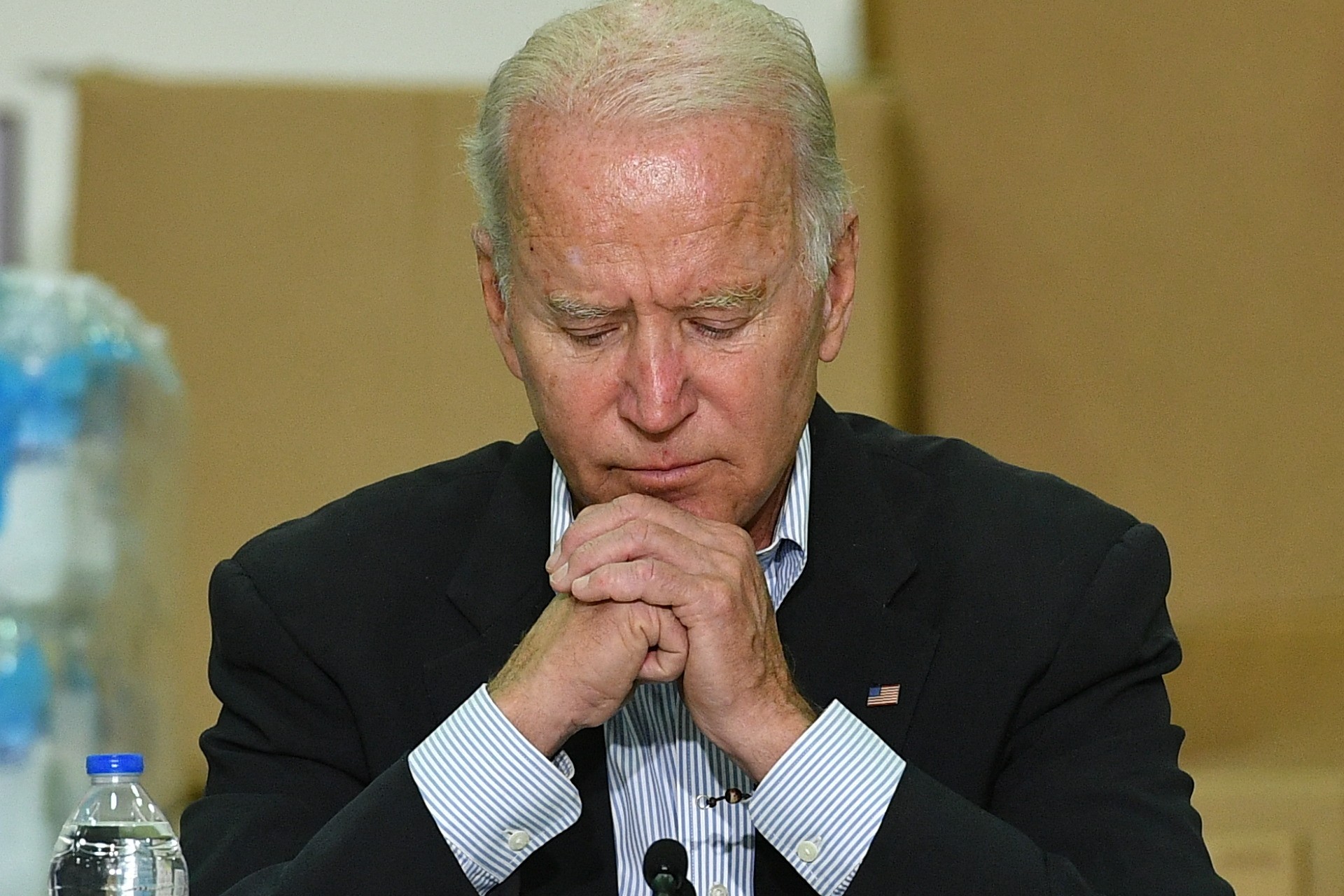
US President Joe Biden takes part in a briefing with local leaders in the aftermath of Hurricane Ida. (MANDEL NGAN/AFP via Getty Images).
Barely two weeks after gifting the Houthis with removal from its list of foreign terrorist organizations in February, the Biden State Department was pleading with the Yemeni insurgents to stop launching terrorist attacks, including drone and missile strikes on Saudi Arabia’s oil infrastructure and civilian airports.
The Houthis also did not hesitate to use sickness and starvation as weapons against the people of Yemen, blocking millions of dollars in international humanitarian aid. The ostensible reason for delisting them as terrorists was to encourage them to allow foreign aid to reach the huge numbers of sick and hungry people in Yemen.
One week ago, on August 31, the Houthis used drones to attack the Abha civilian airport in Saudi Arabia. Eight injuries were reported from shrapnel, one of them critical, and a Saudi Arabian Airlines Airbus A320 passenger plane was damaged. The Saudi military said it was able to intercept one drone before it reached the airport.
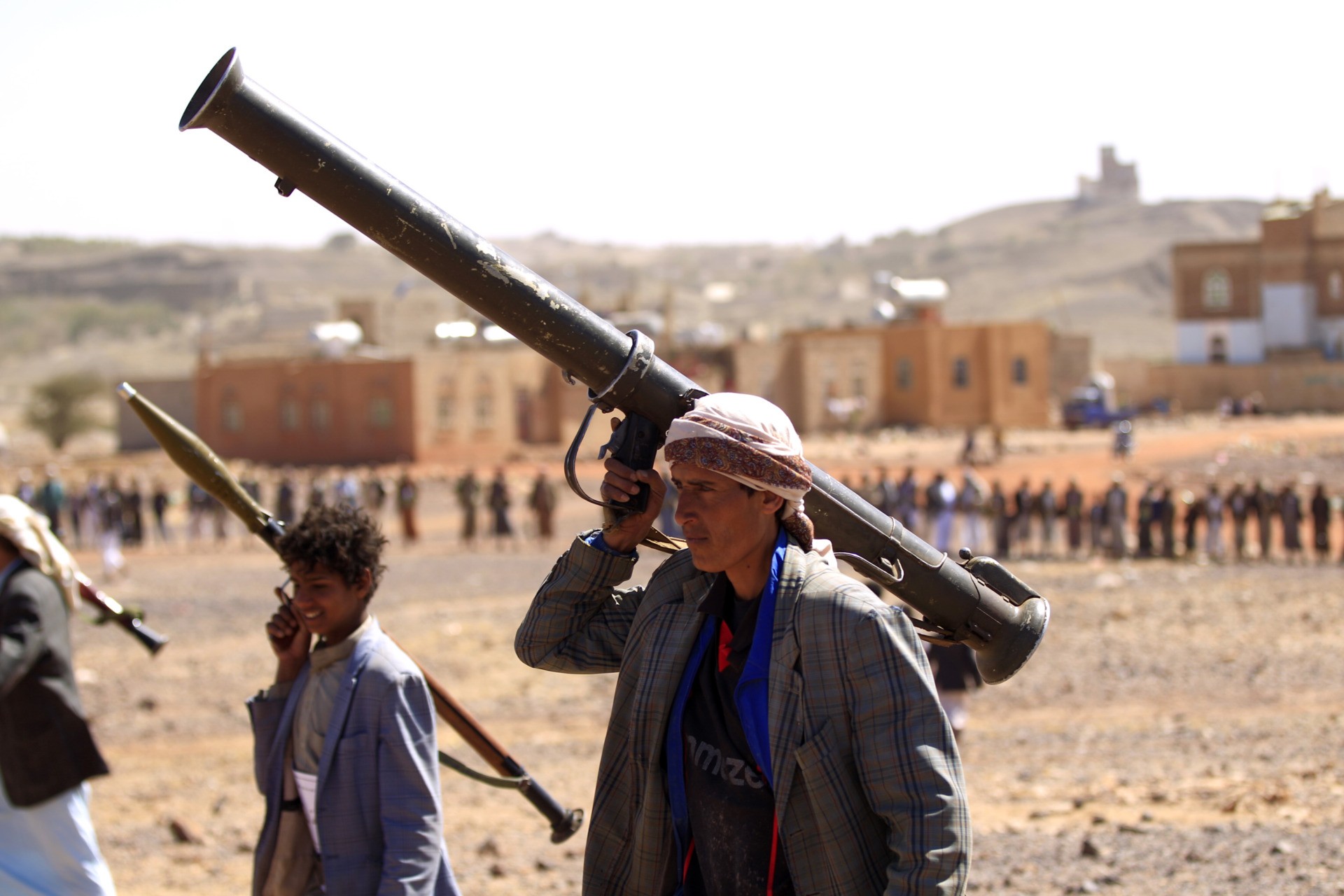
A Yemeni man carries a rocket launcher as he takes part in a gathering near the capital Sanaa to show support to the Shiite Huthi movement against the Saudi-led intervention. (MOHAMMED HUWAIS/AFP via Getty Images).
Houthi drones are increasingly sophisticated flying bombs, modeled on Iranian designs. The latest generation of drones employed by the insurgency appears capable of striking targets over a thousand kilometers away.
Secretary of State Antony Blinken issued a statement “strongly condemning” the Abha attack on August 31. As Blinken indicated, it was merely the latest in a series of ineffectual condemnations from the Biden administration:
Since the beginning of the year, Saudi Arabia has endured more than 240 attacks from the Houthis, who have endangered the Saudi people alongside more than 70,000 U.S. citizens residing in Saudi Arabia. The Houthis have also intensified their attacks inside of Yemen in recent weeks, particularly their offensive on Marib.
This costly, stalemated offensive is exacerbating Yemen’s humanitarian crisis. The Houthi attacks are perpetuating the conflict, prolonging the suffering of the Yemeni people, and jeopardizing peace efforts at a critical moment.
We again call on the Houthis to uphold a ceasefire and engage in negotiations under UN auspices.
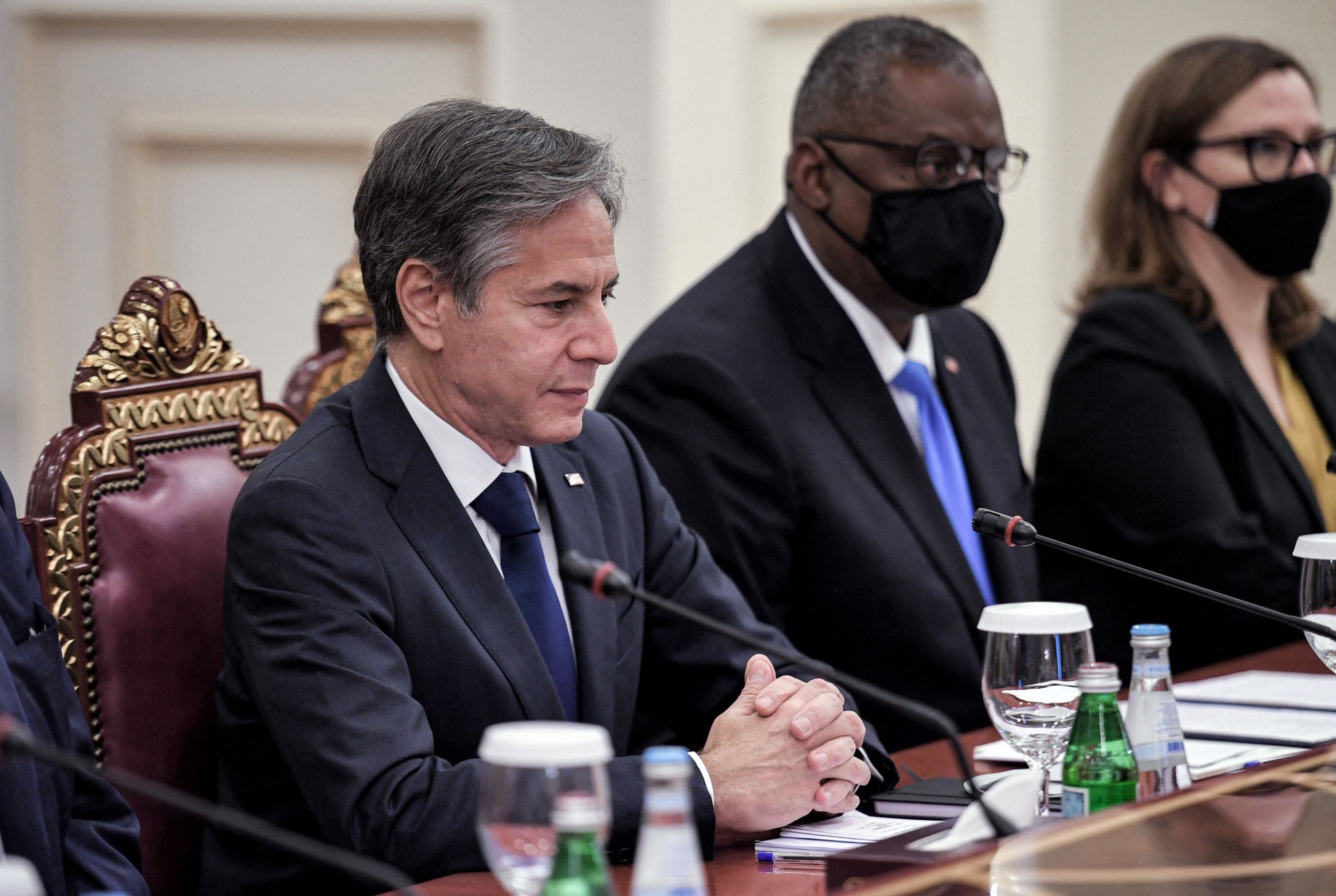
US Secretary of State Antony Blinken (L) and Secretary of Defense Lloyd Austin (2nd-L) meet with Qatari Deputy Prime Minister and Foreign Minister Mohammed bin Abdulrahman Al Thani and Qatari Deputy Prime Minister and Defense Minister Dr. Khalid bin Mohammed Al-Attiyah, at the Ministry of Foreign Affairs in Doha, Qatar. (OLIVIER DOULIERY/POOL/AFP via Getty Images).
The Houthis ignored Blinken and struck again on Saturday with a significantly more dangerous attack, launching drones plus ballistic missiles at multiple civilian targets in eastern Saudi Arabia, according to the Saudi-led military coalition.
The coalition accused the Houthis of “deliberately targeting civilians and civilian objects,” including infrastructure belonging to the Saudi Aramco oil company and the cities of Najran and Jazan.
At least one of the Houthi missiles was intercepted, scattering shrapnel across the suburb of Dammam and injuring two Saudi children. Saudi media reported 14 homes were damaged by the shrapnel. Three explosive-packed drones were also shot down on their way to Saudi airspace.
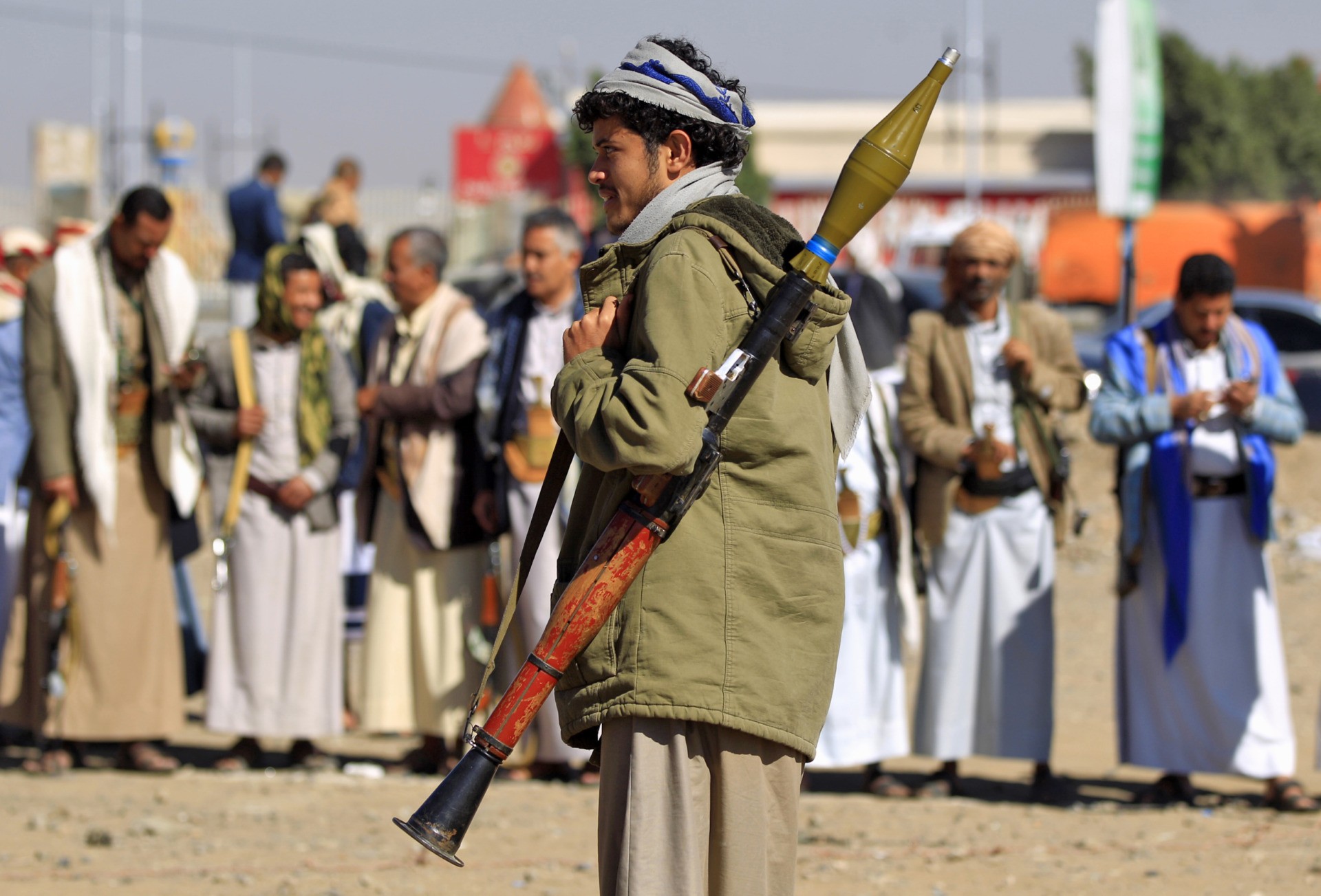
An armed Yemeni man holds a rocket launcher as people gather in the capital Sanaa to show their support to the Shiite Huthi movement against the Saudi-led intervention. (MOHAMMED HUWAIS/AFP via Getty Images).
Blinken on Sunday issued a statement nearly identical to the one from August 31, once again condemning the “unacceptable” attack and noting the lives of children were endangered. He wrote as if the Houthis have taken leave of their senses, and need only a few more reminders that they are not supposed to be terrorists anymore:
The United States condemns the latest Houthi missile attack against Saudi Arabia that struck the Eastern Province on September 4, injuring two children and damaging several homes. This is completely unacceptable. These attacks threaten the lives of the Kingdom’s residents, including more than 70,000 U.S. citizens.
We once again urge the Houthis to agree to a comprehensive ceasefire immediately and to stop these cross-border attacks and attacks inside of Yemen, particularly their offensive on Marib, which is exacerbating the humanitarian crisis and prolonging the conflict. The Houthis must begin working toward a peaceful, diplomatic solution under UN auspices to end this conflict.
The exasperated Wall Street Journal editorial board Monday suspected the Houthis are learning a few lessons from the Taliban about how to handle the hapless Biden administration:
The liberal internationalists who run the State Department seem to believe that asserting a demand for a diplomatic solution will make it so. But as with the Taliban in Afghanistan, the Houthis and their Iranian backers believe they can win the war without negotiating as they see the U.S. retreat and abandon its allies. All of Antony Blinken’s protests won’t stop a missile in mid-flight.
According to Jane’s defense news Tuesday, the Houthis — who refer to themselves as “Ansar Allah,” the “Servants of God” — launched a total of six ballistic missiles Saturday, plus a total of ten explosive drones. One of the missiles was an Iranian-made Zulfiqar short-range ballistic missile, or a close domestically-produced copy.
Jane’s quoted the Saudi Ministry of Defense claiming to have intercepted three of the missiles and three of the drones. One of the surface-to-air missiles launched by the Saudi air defense system appears to have malfunctioned during the incident.
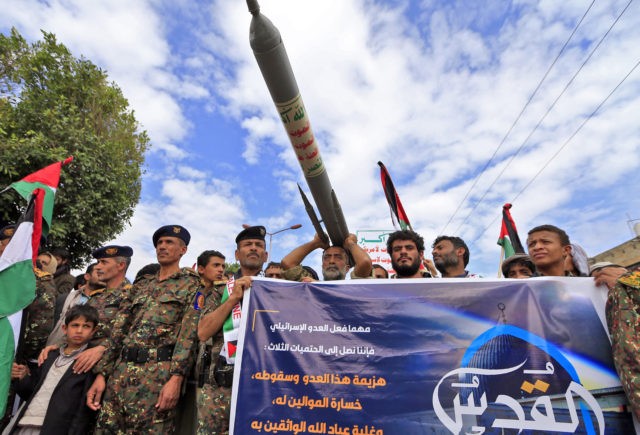
COMMENTS
Please let us know if you're having issues with commenting.